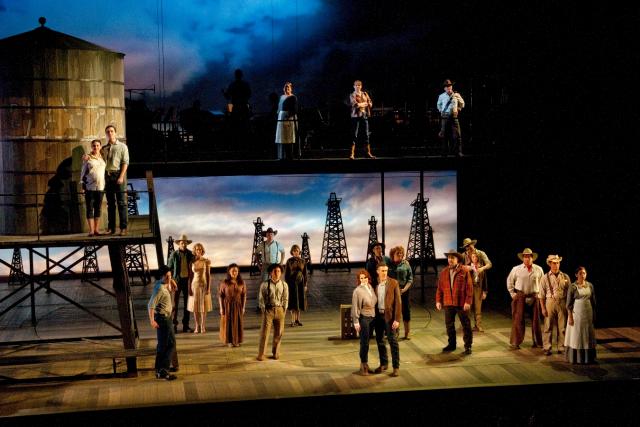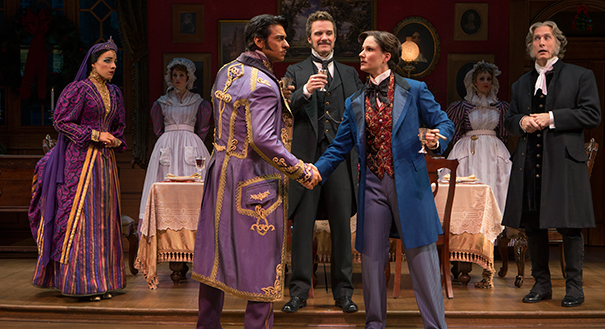“He that is not with me is against me: it was nonsense. Committed–it was the great contemporary word and the great contemporary fallacy. One view or the other–nonsense again. He wasn’t privy to it, never would be. A man committed was less than a man.”
William Haggard, Venetian Blind
Archives for 2012
TT: An Oklahoma! for our time
In today’s Wall Street Journal drama column I review the New York premieres of Giant and The Performers. The first is sublime, the second wretched–so much so that its closing notice was posted yesterday, just after the Journal page containing this review was sent to the printers! Here’s an excerpt.
* * *
The Broadway musical has never been more popular, or less interesting. No other genre remains so essential to the American stage, yet no more than a half-dozen new musicals of indisputable quality have made it to Broadway since the turn of the twenty-first century, and the creative torpor that afflicts the genre continues to grow deeper. If you want to see a first-rate new musical nowadays, you’ve got to look to Off Broadway or regional theater. Michael John LaChiusa’s “Giant,” for instance, was premiered at Signature Theatre of Arlington, Va., three years ago and has now reached the Public Theater after an intermediate stop in Dallas. About time, too, for “Giant” is the most important new musical to come along since “The Light in the Piazza.” It’s a show of immense and fully realized promise–and it deserves to move uptown.
 “Giant” is based on Edna Ferber’s sprawling 1952 saga of life and love on a Texas cattle ranch, which George Stevens later turned into a widescreen extravaganza starring James Dean, Rock Hudson and Elizabeth Taylor. Mr. LaChiusa and Sybille Pearson, who wrote the book of “Giant,” have wisely chosen to return to the original source, in the process improving it decisively. Ms. Ferber, best remembered for the 1926 novel on which “Show Boat” is based, was a good storyteller but a stiff stylist, and Ms. Pearson’s adaptation retains her page-turning plot while jettisoning virtually all of her leaden prose, leaving plenty of room for Mr. LaChiusa to do his stuff.
“Giant” is based on Edna Ferber’s sprawling 1952 saga of life and love on a Texas cattle ranch, which George Stevens later turned into a widescreen extravaganza starring James Dean, Rock Hudson and Elizabeth Taylor. Mr. LaChiusa and Sybille Pearson, who wrote the book of “Giant,” have wisely chosen to return to the original source, in the process improving it decisively. Ms. Ferber, best remembered for the 1926 novel on which “Show Boat” is based, was a good storyteller but a stiff stylist, and Ms. Pearson’s adaptation retains her page-turning plot while jettisoning virtually all of her leaden prose, leaving plenty of room for Mr. LaChiusa to do his stuff.
It’s no slight to Ms. Pearson to say that her collaborator is the senior partner in “Giant.” Mr. LaChiusa, after all, is one of the two most prodigiously gifted musical-theater songwriters to come along since Stephen Sondheim. Like Adam Guettel, who wrote the score for “The Light in the Piazza,” he uses the language of popular music to serve expressive ends that are fundamentally operatic, exploding the simple chorus-based forms of traditional pop song and expanding them into large-scale structures similar to those used by Mr. Sondheim in “Passion” and “Sweeney Todd.” Not only do his musical numbers drive “Giant” through its dramatic arc with compulsive force, but much of Ms. Pearson’s dialogue is underscored, which prevents “Giant” from losing any momentum along the way. The result is a show that doesn’t have any slow spots–one that feels not long, but big….
Time was when prim West End playgoers went in for bait-and-switch farces with titles like “No Sex Please, We’re British” that took care to promise far more in the way of fornication than they ever delivered. While such plays have never had much luck on Broadway, that hasn’t stopped David West Read from cooking up a homegrown counterpart of the same flyweight genre. Mr. Read’s “The Performers” is a nominal comedy about a straightlaced couple (Daniel Breaker and Alicia Silverstone) who find themselves thrust among a gaggle of numbskulled porn stars (Jenni Barber, Ari Graynor, Cheyenne Jackson and Henry Winkler) who long for domestic tranquility in between cinematic couplings. I won’t say that “The Performers” is the dumbest play ever to reach Broadway–the competition is stiff–but it may well be the first Broadway play in which five of the six characters are utterly, irredeemably brainless….
* * *
Read the whole thing here.
Excerpts from Signature Theatre’s production of Giant:
TT: Almanac
“I sit down religiously every morning, I sit down for eight hours every day–and the sitting down is all.”
Joseph Conrad, letter to Edward Garnett, Mar. 29, 1898 (courtesy of Jon Winokur)
TT: Not to belabor the point…
…but Satchmo at the Waldorf, my first play, transfers this weekend to Philadelphia’s Wilma Theater, where it will run through December 2. Previews on Friday night and Saturday afternoon, followed by the official opening on Saturday night, at which I’ll be present. Come if you haven’t–or even if you have!
For more information, go here.
TT: So you want to see a show?
Here’s my list of recommended Broadway, off-Broadway, and out-of-town shows, updated weekly. In all cases, I gave these shows favorable reviews (if sometimes qualifiedly so) in The Wall Street Journal when they opened. For more information, click on the title.
BROADWAY:
• Annie (musical, G, reviewed here)
• Bring It On (musical, G, closes Dec. 30, reviewed here)
• Evita (musical, PG-13, reviewed here)
• The Mystery of Edwin Drood (musical, PG-13, most performances sold out last week, reviewed here)
• Once (musical, G/PG-13, most performances sold out last week, reviewed here)
• Who’s Afraid of Virginia Woolf? (drama, PG-13/R, reviewed here)
OFF BROADWAY:
• Avenue Q (musical, R, adult subject matter and one show-stopping scene of puppet-on-puppet sex, reviewed here)
• The Fantasticks (musical, G, suitable for children capable of enjoying a love story, reviewed here)
• Tribes (drama, PG-13, closes Jan. 6, reviewed here)
CLOSING NEXT WEEK OFF BROADWAY:
• The Freedom of the City (drama, PG-13, closes Nov. 25, reviewed here)
TT: Almanac
“A biography is always constructed from ruins but, as any archaeologist will tell you, there is never the means to unearth all the rooms, or follow the buried roads, or dig into every cistern for treasure. You try to see what the ruin meant to whoever inhabited it and, if you are lucky, you see a little way backward into time.”
Loren Eiseley, All the Strange Hours: The Excavation of a Life
TT: An election everyone can love
Because of a glut of openings on Broadway, The Wall Street Journal has given me an extra drama column this week in which I review the Roundabout Theatre Company’s excellent new revival of The Mystery of Edwin Drood. Here’s an excerpt.
* * *
If Charles Dickens had lived to finish “The Mystery of Edwin Drood,” it might have ended up becoming one of his best-remembered books, though not so much for its literary quality as its subject matter. Imagine, if you dare, a novel about an outwardly respectable choirmaster who is secretly addicted to opium and who strangles his nephew in a fit of passion (or does he?) because they’re both in love with the same woman. Who could resist a yarn like that? It’s got everything but serial murder! Alas, Dickens died of a stroke in 1870 before he could pen the final chapters, and the unfinished manuscript became a half-forgotten curiosity known only to Dickens buffs and scholars of Victorian literature–until Rupert Holmes came along.
 Mr. Holmes, a multitalented singer-songwriter who topped the pop charts in 1979 with “Escape (The Piña Colada Song),” had the uncommonly clever idea to turn “Drood” into a Broadway musical in which the audience is invited to vote on the ending. Is Edwin Drood really dead? If so, did John Jasper, the mad choirmaster, kill him–or was he murdered by one of the other characters? As gimmicks go, that’s a pretty slick one, and though Mr. Holmes had never previously written anything for the stage, “The Mystery of Edwin Drood” ran for 608 performances. Now the Roundabout Theatre Company has brought “Drood” back to Broadway in a revival directed with rip-roaring éclat by Scott Ellis, and I’ll be surprised if it doesn’t run at least as long as the original 1985 production. For sheer fun, this show is hard to top….
Mr. Holmes, a multitalented singer-songwriter who topped the pop charts in 1979 with “Escape (The Piña Colada Song),” had the uncommonly clever idea to turn “Drood” into a Broadway musical in which the audience is invited to vote on the ending. Is Edwin Drood really dead? If so, did John Jasper, the mad choirmaster, kill him–or was he murdered by one of the other characters? As gimmicks go, that’s a pretty slick one, and though Mr. Holmes had never previously written anything for the stage, “The Mystery of Edwin Drood” ran for 608 performances. Now the Roundabout Theatre Company has brought “Drood” back to Broadway in a revival directed with rip-roaring éclat by Scott Ellis, and I’ll be surprised if it doesn’t run at least as long as the original 1985 production. For sheer fun, this show is hard to top….
Mr. Ellis keeps his actors on the gallop, and they give every sign of having the time of their lives, especially the plummy-voiced Jim Norton, who never met an “r” he didn’t rrrrroll. No less amusing is Chita Rivera, the proprietress of the opium den in which Jasper (Will Chase) takes his discreet leisure. Ms. Rivera delivers her lines in an accent that is an indescribably complicated and preposterous mixture of mock-Cockney and…well, something else. While the singular talents of Jessie Mueller, one of the most gifted young singers to hit Broadway in the past decade, are largely wasted on the supporting role of Helena Landless, an exotic babe from Ceylon, it’s still a pleasure to see and hear her in any capacity whatsoever….
* * *
Read the whole thing here.
TT: Snapshot
New York City Ballet performs two excerpts from George Balanchine’s Liebeslieder Walzer, set to music by Brahms. This performance was originally telecast on CBC’s L’Heure du concert in 1961. The featured dancers in the first sequence are Jillana and Conrad Ludlow:
(This is the latest in a series of arts-related videos that appear in this space each Monday and Wednesday.)
